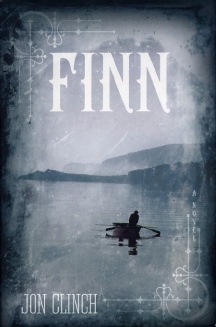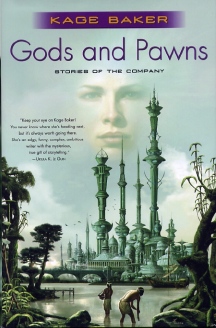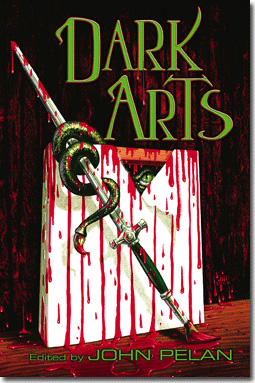|
|
|
|
This Just In...News
From The Agony Column
|
| |
|
02-10-07:
Preview for Podcast Monday, February 12, 2007
|
| |
The Meat Is Not You
I'm posting another MP3
preview audio trailer for Monday's podcast today. I hope listeners enjoy
this and will be tuned in for the upcoming podcast.
|
| |
|
02-09-07: The
Return of 'Nada' by Carmen Laforet
|
| |
Doomed to Repeat
|

|
Nothing
to see here, move along.
|
The problem with
the old saw that, "Those who do not learn from history are doomed
to repeat it," is that if history demonstrates anything, it
is that we do not learn. And so we read the news, we vote according
to our beliefs, we buy what we can (and often cannot) afford, we
live our lives daily and perhaps sit down to read a book and reflect
on those lives. We know we're repeating some bit of history. The
question is which bit? Are we in London, about to enter the golden
era during which the sun never sets on our empire? Or are we in Rome,
ignoring barbarians?
Pick up 'Nada' (Modern Library / Random House ; February 13, 2007 ; $22.95)
by Carmen Laforet and you may have the unfortunate feeling
that we're in post-civil war Spain. Barcelona to be exact. Little bits look
pretty nice. You may have a weird extended family, but in general your life
is comfortable, right? Sure, there are some homeless folks on the streets,
but you're not in danger of joining them are you? You're not about to be
marginalized, right?
And so we never learn, but if we can't learn, at least we can read. Laforet's
novel is a powerful, dark, and gnarly (in the Ruckerian sense) story of a
college gal who moves in with her family to attend university. Her family
is pretty bonkers. Her aunt is Angustias is pushy and superstitious. Her
uncle Román is an artist, always a bad sign in an adult. His brother
Juan is fast to use his fists and everybody makes do because Juan's wife,
Gloria is a gifted, wait for it, gambler. This is not the photo family that
every college girl needs, especially not if she's hanging with the sort of
rich and indolent know-it-alls she meets at Uni. What's a girl to do but
write it all down, as the novel follows Carmen Laforet's life to a degree
that suggests autobiography. Well, at least in terms of today's bestsellers.
'Nada' looks at life in as time covered in the recent and well-wrought movie
'Pan's Labyrinth', and might very well be of interest to readers who enjoyed
that movie. It does not have the fantastic aspects of that movie, but it
has the dark atmosphere of what was going on in the big city of Barcelona
at the time. Nothing good. The Spanish Civil War was seen as a warm-up for
World War Two. Society was being splintered in the aftermath of this Civil
War, the rich getting richer, the poor getting poorer, the middle class getting
poorer as well. Not that anything like that could happen here.
Back when the novel was first published, in 1945, autobiography was a little
bit more stringent an art form than it is today, so 'Nada' is a novel. Well,
it's also dripping in dank, complicated atmosphere. Where 'Nada' gets personal,
for those of us in the shrinking middle class, is that the polarized society
of the early days of the Franco regime looks like about two steps from where
we are now. Of course, it's too much to expect that anyone could learn from
this exercise. But we can be glad that Random House / Modern Library have
finally reprinted this novel in a new translation. It's been out of circulation
for years now, and used copies aren't exactly cheap, going at $13 for a fourteen-year-old
softcover. It's now back in print. If we cannot learn from history, then
at least we can read about it while it repeats itself.
|
| |
| |
|
02-08-07: Cold Comfort from Subterranean Press
|
|
A Review of 'Reassuring Tales' by T. E. D. Klein
|
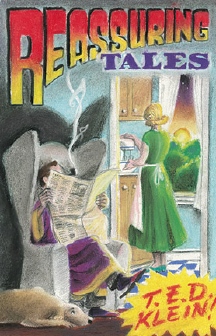
|
I
feel better already.
|
Just who is T.
E. D. Klein? ONLY one of the most noted and notable authors and editors to emerge
in the 1970s and 1980s. The span from his first
publication, "The Events at Poroth Farm" (1972) to his latest
collection, now out from Subterranean Press, 'Reassuring
Tales' (2006)
(which, coincidentally concludes with that first story) is long enough
that his name might have passed from memory. That is clearly not the
case. A winner of the British Fantasy Society’s Best Novel award
for 'The Ceremonies', and the World Fantasy Award for his novella "Nadelman’s
God" (collected in 'Dark Gods'), Klein and his work remain important
and relevant to horror fiction and American literature because Klein
is one of the horror genre’s most careful writers. Every word
is placed for maximum impact with minimal fuss. He writes in a normal
voice,
from points of view that anyone can understand, yet he offers us
visions of horrors and ages unseen.
My first encounter with Klein was in Kirby McCauley’s definitive
collection 'Dark Forces'. His story, "Children of the Kingdom" haunts
me to this day with its fleeting glimpses of the horrors under our feet,
under our streets, the horrors that entwine with every day of our lives.
It’s the everyday quality that makes Klein so unique. He creates
characters who seem like our neighbors, who live resolutely in our
world. Then he shows us just how little we know of that world. How
much there
is to fear.
Klein himself has distinguished himself not just with his writing but
his editing as well. His time as editor of The Twilight Zone Magazine saw the
introduction of authors we still read; I can't say with certainty,
as my TZ magazines may have actually...decomposed at this point, but
he may have
been the man who brought us Dan Simmons. Interesting how a single,
short-run publication could have had such an impact on our literary
heritage. But
it is his writing we look forward to most, the precise prose compositions
that pry into our fears and desires, that join them then revel in what
follows. For those of us who have read his work, this review is almost
superfluous. Be assured I don’t reveal any plot details in my review,
but I can give you sense of why this book is easily worth $40 – and
why the lettered edition is long sold out.
|
| |
|
02-07-07: A Review of 'The Terror' by Dan Simmons
; A Review of 'Dark Arts' edited by John Pelan by Mario Guslandi ; Seeing 'Blindsight' by Peter Watts
|
|
Grand American Adventure
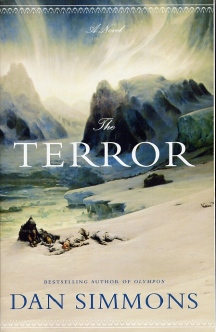 |
|
| Have
I posted this image enough times? |
I wanted to get
this review of 'The
Terror' by Dan Simmons out there quickly, while signed copies
may still be lurking in selected bookstores. While
I no longer
can be bothered with a ten best list (as the band Sick of It
All once sagely stated, "Just Look Around") were I to
be inclined, I think this one would already be at the top of
that list for this year
and I'd be surprised to find another title to dislodge it. It's
that good. Satisfying on all levels, it annihilates any expectation
that you
might have that a 700-plus page book about a doomed arctic expedition
might have some slow parts. I'd be pretty tempted to say that 'The
Terror' is Dan Simmons' best novel. It is immensely rewarding
to a huge variety
of readers, whether you are looking for literary fiction (Simmons
uses a sophisticated literary palette and makes it utterly
transparent), science
fiction (there is plenty of science here and even a monster), horror
(the conditions on board the ship make the monster look pretty
good, as do some of the men) or historical fiction (even though
Simmons leaves
history behind pretty early in the novel). This book will provide
you with everything you could desire as a reader, and will,
one hopes, put
Simmons in the mainstream literary map. Here is a novel that not
only should be a bestseller, it stands some chance of actually
becoming a
best seller. I cover a lot more of this in the full-length review,
which I offer to readers. But don’t wait; buy the signed
copies while you can.
|
|
The Art of Horror
Mario Guslandi is back with a
review of the latest HWA anthology, 'Dark Arts' edited by John Pelan, from Cemetery Dance, and
by what he says,
it sounds pretty sweet. Well, sweet if you like a cavalcade of
horror stories, most of them quite well done. The theme of
this anthology
is Art, so you'll get a few sculpture stories, some painting
stories, music
stories and even Jeff VanderMeer's story about writing, "Learning
to Leave the Flesh". Now if only I could learn to leave the
books behind, my economic status might not be an appropriate subject
for a
horror story.
|
|
Open Your Eyes
|
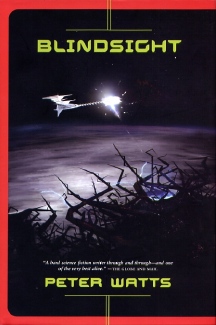
|
Not
my favoritte cover design, but a great novel.
|
Well, it's not as if my eyes are closed. I'd just been hoping that Tor
might actually send me a review copy of Peter Watts' 'Blindsight' (Tor
/Tom Doherty Associates ; October 3, 2006 ; $23.95). So I waited. And
I waited. Then I saw the book used at Logos Books, but I was still waiting.
Finally, I stopped waiting and started buying, file under economic horror
story, see above.
'Blindsight' is Peter Watts long-awaited vampire-in-space novel and it
is every bit as wonderful as you might expect. Surreal, dislocating, scary,
bizarre, filled with wondrous sights and Big Thinks easily comprehended,
this is why many of us read science fiction. But for all the science fiction
reasons to read 'Blindsight', the primary reason to do so is to see a great
writer at work. Watts does something that everyone recommends against and
writes so well that he not only gets away with it, he gets his novels published.
That would be making his characters, erm, how shall I say it, erm: unlikable.
Or I guess not so much unlikable, but more Not Nice. Not Cozy. They're
not evil, either, so much as they are themselves, what they need to be.
The premise finds Earth being visited by something from outside the solar
system. Perhaps something that might find us of interest, either to speak
to or consume. Jury's out on that, so humankind gets it together to send
some barely human humans out to meet the greeters. Readers of Watts' Rifters trilogy
(cf 'Starfish' and 'Maelstrom') will know that he is unsparingly unsentimental.
Watts' characters are as ruthless and selfish as they need and want to
be. This
makes them
ALIVE for the reader and that's why he should be on your shortlist any
time you think about buying a book.
'Blindsight' is filled with the usual quirky Watts elements beyond
those in the novel. Extensive apologies for even more extensive research
that
does not quite come up to snuff for this self-demanding author because
Watts is writing science fiction. OK, Mr. Watts, apologize all you
like – we're
going to skip straight to the extensive notes that you give us on the all
the research you did. This is some great damn SCIENCE fiction, and you
need apologize to no-one. Heck there are folks out there in a future hopefully
less bleak than those you have imagined who will write theses about your
notes. They will not be writing home, however about the cover art and design
for this novel. The art is well-executed though bland, but the type and
design are shuddersome. Don’t wait to get this used, don’t
wait to get it sent to you. You shell out full price for this book, you
won’t be sorry. Peter Watts writes great books that happen
to be science fiction, no apologies required.
|
| |
|
02-06-07: A Review of 'Thirteen Moons' by Charles Frazier ; The Color Green
|
|
Beginning and Ending The Journey
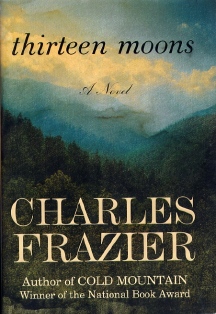 |
|
| I'll
be seeing you again, when we speak of color zen.... |
Oh, the travails of history. Few writers know this better than Charles
Frazier. I
spoke to Frazier last year, and found him to be fascinating,
a compelling storyteller even when he's telling the story behind his
novels. And yes, slacker that I am I'm just now getting the
in-depth review of his novel 'Thirteen Moons' written. That said, it's not exactly
like this book was going to sneak in and out of the bookstore. And just
for smarts' sake, it was worth buying when Frazier toured and signed
them. Is it worth reading? I think so.
It's not an unqualified success, though. Frazier is a powerful and poetic
writer, and he starts the novel magnificently, immersing the reader in
a historical world that is remote, lush and pretty alien. Davy Crockett
times, to be sure, and times covered quite well by Win Blevins' novel 'So
Wild a Dream'. It surprises me, really, that I like these books
so much, but the whole notion of exploring the forest has always
appealed to me.
'Thirteen Moons' does that spectacularly well, enough so that when
we get out of the forest and into the swamp of Washington DC, even
though the
subject is as much if not more interesting, the book itself is less
memorable. I did find it surprising how much of the fantastic Frazier
brought into
his story. For readers who love histories, fantasies that have a
historical backdrop, or world-building science fiction, this is an
excellent reading
experience.
|
| |
|
Looking at Cover Art Trend-Zen
It's been a while since I visited the realm of cover art, but this
weekend I found myself facing the color green, and could not help but
be struck
by the similarities between a number of books Worth Your Valuable
Time. The common theme is the color green, muted, moss-like, organic.
Here
for your delectation is a selection of green-colored books whose
tasteful contents live up to their tasteful covers.
|
|
|
Shades
of muted green for this year's novels. |
Fresh from the press, we have 'Finn' by Jon Clinch, (Random House ; February
27, 2007 ; $23.95), the story of Huck Finn's father. It's serious fiction
and seriously readable, a compelling dark story. Buy two copies, since
you'll be hearing a lot about this novel and make sure you stop by and
see the author when he tours late this month and early next month. And
enjoy the jutted, moss-green cover design by Gabrielle Bordwin.
Yesterday I posted my interview with Dan Simmons, and today I post the
cover his new novel 'The Terror'. I'll try to have a review up tomorrow,
but beyond that lovely green cover lurks no less than one of Simmons' best
novels -- and that is saying quite a bit, since he's one of our premiere
American novelists. Find a signed copy, then by two or three; if you doubt
me, check how much signed firsts of 'Hyperion'a re going for these days.
It's that good, although very, very different. The cover art is from Erich
Lessing; I don't know if it is by Erich Lessing, but it is mighty fine.
|
|
|
MORE
shades
of muted green for this (and late last) year's books.
|
I'm sure that most of you are up on Kage Baker. Her series of novels
about The Company, which begins with 'In
the Garden of Iden' is now
pretty much
available in its entirety from Tor, who continue the journey with
'Gods and Pawns' (Tor /Tom Doherty Associates ; January 23, 2007
; $24.95. Featuring
an original novella, "To the Land Beyond Sunset", and an original
story, "Hellfire At Twilight", it includes stories otherwise
not so easily found. My take is that Kage Baker should be on your
auto-buy list. She's very consistent and very good. With Tor going
great guns and
Baker proving to be prolific, these are boom times for Baker fans.
What more can you ask for than the cover art by Jamie Youll? Not
much, I suggest.
And finally, there's 'Thirteen
Moons' by Charles Frazier, which sort
of stumbled into this article when I set it down next to the other
books and went ... wow. I think the book will have an appeal to SF&F
fans for its skilled worldbuilding techniques. But if not those, then
you
can
certainly
dig
the greenish
cover art
trend-zen look by Thomas
Beek Stvan. It's unclear who the artist is; well beyond Stvan, who
put together a nice package.
You'll note that I've mentioned all four book designers/illustrators
to demonstrate that we're not dealing with a single person here. This
is an
industry vision of what will sell you books. And while the covers
are nice, I hope the industry understands that what sells the books
is what
is inside of them. Sometimes, one is given to wonder. Buy all four
and you have a coffee table display that is to-die-for and well worth
reading.
And keep your eyes open for the next entry in the green book cover
trend-zen. You may not be able to say precisely what this is, but you'll
know it when
you see it.
|
| |
|
02-05-07: "There's
a novel in here"
|
|
A 2007 Interview With Dan Simmons
|

|
Photo
by Howard Gelman of KQED. Thanks!
|
No need
to stop me if this sounds familiar. I first read Dan Simmons when
he won a story contest in 'The Twilight Zone Magazine'; the story was "The
River Styx Runs Upstream". Next stop: Change of Hobbit bookstore,
where I find a new novel by Mr. Simmons titled 'Song of Kali'. Published
by Bluejay Books, who brought us some early John Shirley. At the time,
buying a hardcover novel is something of a big deal for me, but I don’t
hesitate. I've not stopped in the 22 years since.
Simmons is one of our most uncompromising authors, endlessly searching
for something new to write about. While I can understand the frustration
of his publishers, I'm glad that he decided so long ago not to spend the
rest of his life writing Hyperion novels, or Joe Kurtz novels or ... anything
other than what he has done, which was to write what he wanted, what he
found challenging and thought might be rewarding to readers. We've been
more richly rewarded than we might ever have hoped.
To my mind, Simmons is one of America's great writers, and it was a privilege
to speak with him when he was in town last week. Mostly, we talked about
his new novel 'The
Terror', a phenomenally great work of adventure. The
first serious novels my father ever handed me were the works of Jack London,
and I couldn’t help but think of them as I read 'The Terror'. It's
a totally satisfying, immersive read with some outstanding scenes of, well,
terror, and wonder as well.
I'd spoken with Simmons before,
and I knew what to expect. Simmons is a
great speaker, the kind of guy who makes your job as interviewer easy.
Readers can download the MP3, the RealAudio, or as ever, subscribe
to the podcast. This is a conversation you don’t want to miss. If you haven’t
heard the first interview, I'd recommend listening to that one first as
it covers more of Simmons' history as a writer. This time around we focused
on 'The Terror', but did find time to talk about the future as well as
the past. The River Styx flowed and we followed.
|
|
| |
|
|


